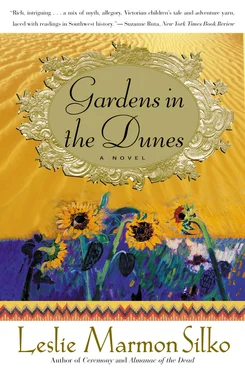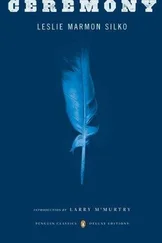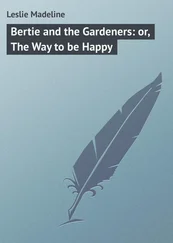Indigo was relieved to see that none of the Indian women had noticed her, dressed as she was like a white girl. What did Hattie think? Those women were strangers from tribes Indigo knew nothing about; what was she supposed to say to the Indian women? They would see the clothes and hat she wore and they would laugh and say, “What kind of Indian are you?”
They ate lunch in the dining room of Albuquerque’s only hotel, where the white people noticed Indigo and stared at her and Hattie and Edward as they walked through the hotel lobby to return to the train. Indigo smiled to herself; in Needles no Indians were allowed in the café or the hotel lobby. Edward found a two-week-old New York newspaper for sale in the smoke shop of the hotel, and Hattie bought a tin box of taffy.
Back on the train, Edward read the newspaper while Hattie and Indigo opened the candy, only to discover the taffy had hardened like bits of rock. Indigo was not discouraged; she showed Hattie how she and Sister Salt ate the hard dried dates, softening them first in their mouths for a long time; she did the same with the hard taffy.
“If Sister Salt is your big sister,” Hattie said, “do you have other sisters and brothers?”
“I don’t know,” Indigo said as she rolled the piece of taffy with her tongue. “Mama might have a new baby by now.”
“Indigo,” Hattie began in a soft voice, “I want to talk to you about your mother. The records at the school say you were orphaned.”
She was no orphan, Indigo assured Hattie confidently. She knew where her mother was, and her sister too. Her mother had escaped with the Messiah and his family and the other dancers into the mountains.
“The Messiah? Who is the Messiah, Indigo?”
Indigo looked into Hattie’s blue eyes to see if she was serious, or just teasing.
“You don’t know who the Messiah is?”
Hattie shook her head.
“Sure you do. It’s Jesus Christ.”
“Yes, but the Jesus I know lived very long ago, far across the ocean.”
Hattie hesitated before she said Jesus died in Jerusalem. Indigo shook her head; many were fooled by what happened. The Paiute woman told them after the soldiers tried to kill Jesus, he left that place and returned here to his home up in the mountains. He lives there with his family, but sometimes the Messiah takes his family great distances to visit other believers.
Hattie seemed at a loss for words, so Indigo explained: “When the people dance night after night, the Messiah and his family come down to join the people.”
The child’s vivid imagination lifted Hattie’s spirits. She had begun to feel unsettled, though she could not locate the source of her disquiet. Hattie put the lid on the candy tin and opened one of the garden books she had brought along to amuse herself and the child on the long train ride. She looked forward to the new book about sunflowers the bookseller in Los Angeles sent her just before their departure. She brought an old archaeological guide to the stone shrines of the British Isles because the book contained Celtic legends Hattie thought Indigo might enjoy.
Hattie agreed to accompany Edward abroad only because the travel would be very educational for Indigo; she felt responsible to see the child continued to learn reading and writing while in her care. Indigo was absorbed by the gardening book and studied each illustration for a long time before she turned the page. She asked Hattie the English names of the flowers and seemed especially fascinated with the gladiolus, which reproduced itself with clusters of cormlets.
Edward folded the newspaper as Hattie joined him at the little table.
“Anything interesting in the Albuquerque newspaper?”
“Oh, nothing too interesting, really. Your neighbor from Oyster Bay, Mr. Roosevelt, has been mentioned as a possible running mate for McKinley this time around.”
“That’s interesting. I expected Mr. Roosevelt to settle for nothing short of the presidential nomination.” Hattie thought McKinley the worst of the greedy politicians. Edward smiled. She sounded like her father, Edward teased, “Don’t forget: the budgets for acquisitions and independent contractors at the Smithsonian and for the Bureau of Plant Industry were quite generous under the McKinley administration.”
Hattie laughed. “So I sound like my father, do I?”
Just then the tray of tea and pastries arrived, and Hattie’s expression became serious.
“Indigo says she has a mother and an older sister,” Hattie began. “As soon as we return, I want to look into this.”
But Edward was doubtful. The government required that strict records of the Indians be kept; Indian mothers did not easily part from their children. Hattie glanced over at Indigo, who had started through the book of gardens a second time. The boarding school was run like prison; it was no place for a child as bright as Indigo. Hattie drew herself up straight in the seat. They didn’t care the child was lost — they called off the search after only a day!
“Nothing government employees do surprises me,” Edward said. “Remember, I’ve worked with them in the field. The Indian Bureau employees are some of the worst.”
♦ ♦ ♦
The train stopped in Kansas City to change crews, which was enough time for a stroll through the downtown, though the humidity and heat were considerable. While Edward was at the telegraph office, Hattie and Indigo visited the soda fountain next door. Indigo loved the vanilla ice cream but the fizzing bubbles of the soda went up her nose and brought tears to her eyes. They saw a disabled automobile blocking traffic; the freight wagons and buggies jammed the downtown streets.
Indigo had not seen a Negro woman before, only Negro soldiers. She tugged at Hattie’s sleeve and pointed at a tall, majestic dark-skinned woman who passed them in a lovely dress of pale yellow cotton trimmed in green satin ribbon; she wore a wonderful yellow felt hat with a single green feather and amazing button-up shoes of pale yellow leather with pearl buttons. As they walked through downtown Kansas City, Indigo saw a number of dark women dressed in satins and silks of the brightest prints and colors. On the streets crowded with people in clothing as ordinary as the dust, the Negro women were as lovely as hollyhock flowers in all their colors. Indigo decided they were more beautiful than white women in their pale colors of gray and beige.
Back on the train just after dark, Hattie pointed out the window to the great Mississippi River, as they crossed over it; but all Indigo saw was an ominous, surging darkness that went on and on like no river she ever saw. Night was the most difficult time; she missed Mama and Sister, and the thought of Linnaeus, alone in the distance and the darkness, made her cry. Her body was so tired of the motion of the train; her back and knees hurt from all the sitting. She lost count of the days they’d been gone. What if Hattie was not able to persuade the school authorities to let her go live with Sister Salt? What if Hattie gave up and left her at the school? The school authorities never intended to let her go home. Tears filled her eyes when she thought of Sister Salt, dragged away with the others considered too old and unruly for school. Yet she could not think of Sister without remembering her fierce will and her quick wits. Sister Salt would escape the first week. Indigo was so proud of her sister that her spirits lifted and she drifted off to sleep, recalling the fun she had with Linnaeus in the red garden with the pomegranate trees.
They changed trains in Chicago in the middle of the night. Indigo awoke as Edward carried her off the train, wrapped in a blanket in her nightgown. She was embarrassed to be close enough to smell Edward — not just the soap he washed with but his odor. He held her lightly as if he were afraid she would break; women carried her differently. She pretended to be asleep and kept her eyes shut tight as they moved along the crowded platforms until they found the train and their car.
Читать дальше












